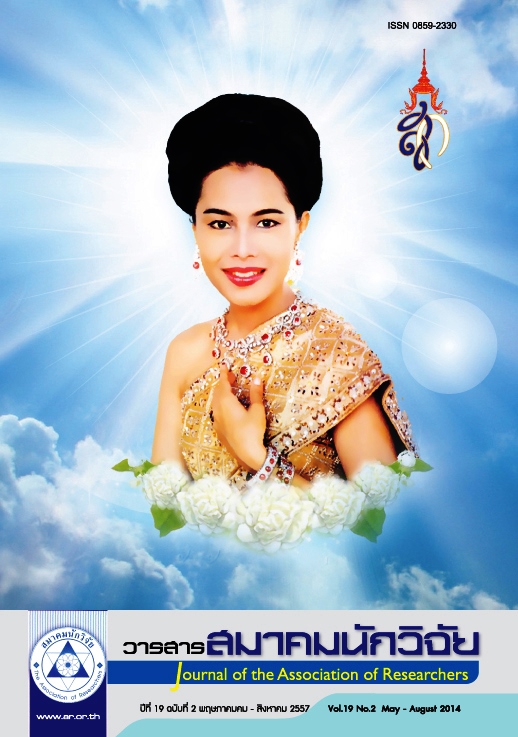thai youth’s voluntary applications of drug treatment.
Main Article Content
Abstract
The study employed qualitative and retrospective methods to investigate the young people who had willingly received the therapy from the Multidisciplinary Team at the Andaman Addiction Treatment Centers. In-depth interviews and observations were the main methods for data collection. The key informants consisted of persons from three categories: patients who were amphetamine addicts, therapists from the hospital including doctors, nurses, psychiatrists and psychiatrist social workers, and patients’ family and associates. Results of the study revealed that most young people decided by themselves to receive the therapy from the Centers due to their love and care for their parents, religion, and an awareness of the results of amphetamine use, and most importantly support from family members. Factors affecting their decision to enter the Addiction Centers included acceptance from their family and associates as well as being a part of society. Suggestions to improve the efficiency of the Addiction Centers were the good relationship between therapists who supervised them very closely and continuously when they returned home; patients’ self understanding; the process of modifying the patients’ behavior, attitudes and thinking; participation and cooperation among involved units; strict policy and enforcement of the law regarding amphetamine use among Thai youths.
Article Details
บทความที่ปรากฏในวารสารนี้ เป็นความรับผิดชอบของผู้เขียน ซึ่งสมาคมนักวิจัยไม่จำเป็นต้องเห็นด้วยเสมอไป การนำเสนอผลงานวิจัยและบทความในวารสารนี้ไปเผยแพร่สามารถกระทำได้ โดยระบุแหล่งอ้างอิงจาก "วารสารสมาคมนักวิจัย"
References
ดรุณี ภู่ขาว.(2548).การพัฒนารูปแบบการบำบัดที่เหมาะสมกับสภาพสังคมไทยที่ใช้ในการบำบัดผู้ที่ประสบปัญหาเกี่ยว เนื่องจากการดื่มแอลกอฮอล์, บูมซิบีที, เอกสารหมายเลข 10 ประกอบการบรรยายในการประชุมเชิงปฏิบัติการ โครงการลดความเสี่ยงด้านสุขภาพจาก แอลกอฮอล์ วันที่ 19-20 ตุลาคม 2548 ณ ห้องประชุม ประเมิน จันทวิมล อาคารกรม ควบคุมโรค กระทรวงสาธารณสุข.
------------.(2553).การประยุกต์ใช้แนวคิดการเพิ่มแรงจูงใจให้บุคคล/องค์กรเกิดการเปลี่ยนแปลง การประชุมวิชาการยา เสพติดแห่งชาติครั้งที่ 11 ปี 2553 เรื่อง รู้ลึก รู้จริง รู้ทันยาเสพติด:Update in Addiction.หน้า 34-41. กรุงเทพมหานครฯ.
-----------.(2554).องค์ความรู้ด้านการศึกษาวิจัยและการจัดทำโครงการในต่างประเทศเพื่อส่งเสริม การเข้าถึงบริการการบำบัดแบบสมัครใจในกลุ่มผู้ติดสารเสพติด.กรุงเทพมหานครฯ.
ดรุณี ภู่ขาว และคณะ.(2553).โครงการปัจจัยความสำเร็จด้านการเพิ่มจำนวนผู้เสพและผู้ติดเข้าสู่ กระบวนการบำบัด ฟื้นฟูระบบสมัครใจในการปฏิบัติงานระดับพื้นที่.กรงุเทพมหานครฯ.
------------.(2555.) หนังสือหลักสูตรฝึกอบรมการบำบัดผู้ติดสรุาและสารเสพติดด้วยการปรับเปลี่ยนความคิดและพฤติกรรม (Cognitive behavioural Therapy). เชียงใหม่.แผนงานการพัฒนาระบบรูปแบบและวิธีการบำบัดรักษาผู้มีปัญหา การบริโภคสุราแบบบูรณาการ (ผรส.)สำนักงานกองทุนสนับสนุนการสร้างเสริมสุขภาพ.วนิดาการพิมพ์.
Merriam,S.B.(2009).Qualitative Research : A guide to design and implementation,San Francisco:Jessey-Bass.
Strauss,A.,&Corbin,J.(1994).Grounded theory methodology: An overview. In N.Denzin&Y.Lincoln (Eds.),Handbook of qualitative research (pp.273-285).Thousand Oaks,CA:Sage
Yin,R.K.(2003).Applications of case study Research : Design and Methods.Thousand Oaks,Sage.


